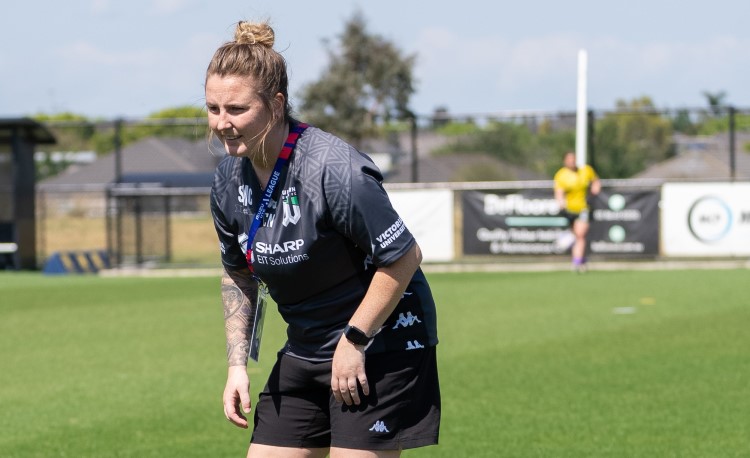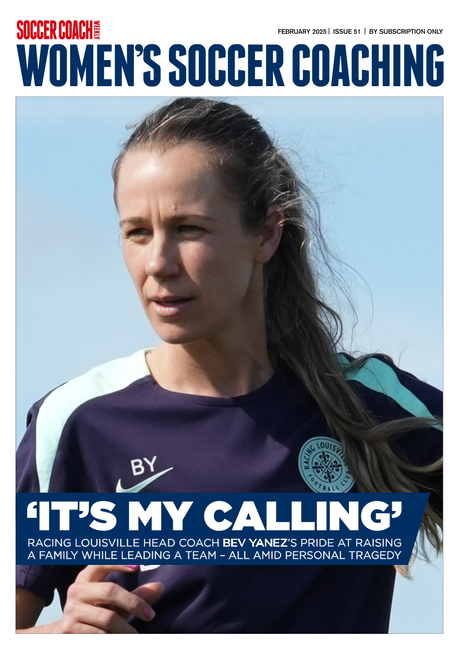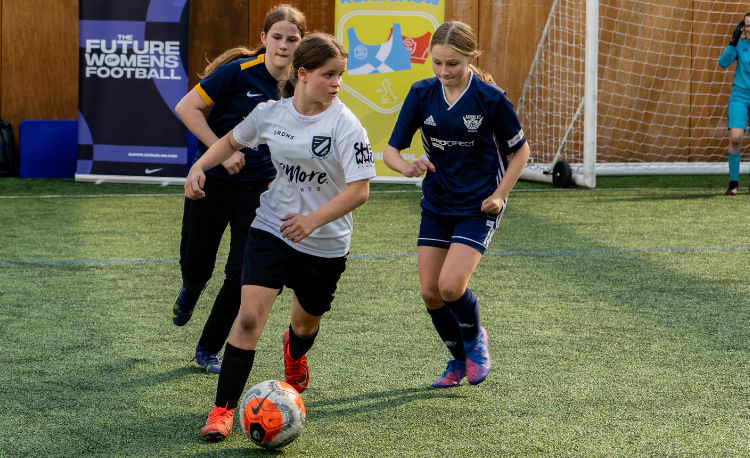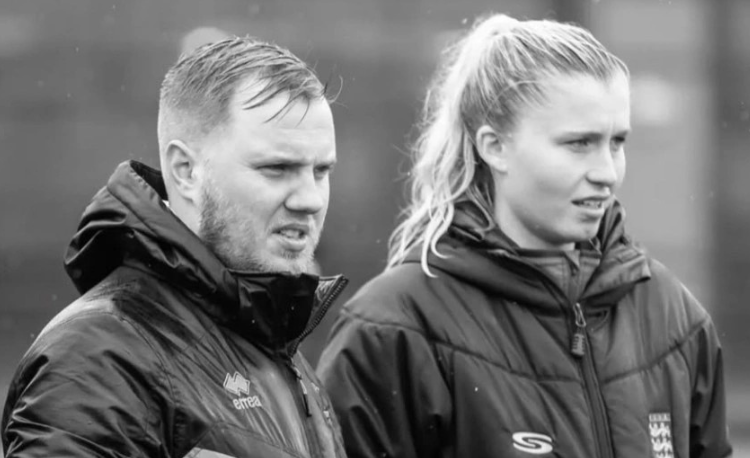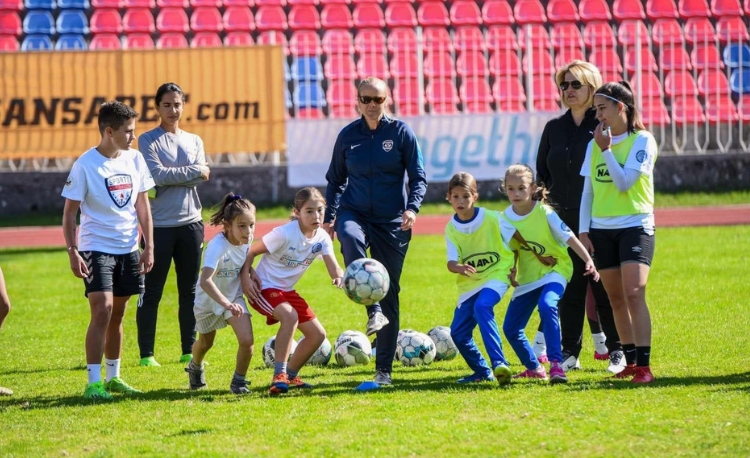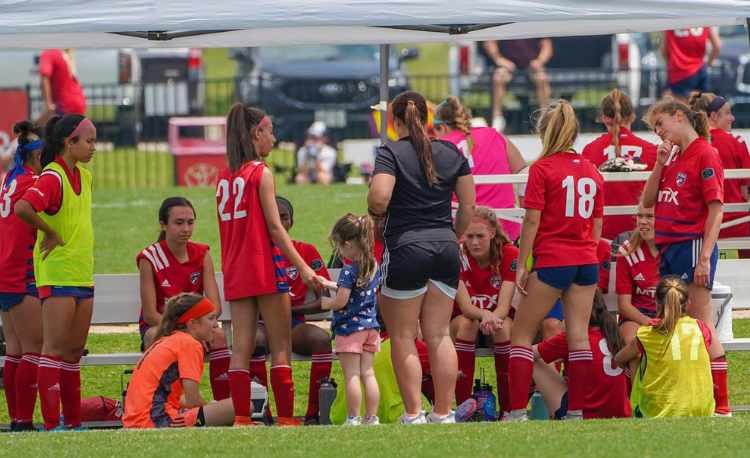You are viewing
1 of your 3 free articles
Chelsea Noonan: Moving to Australia
Having left her role working with Ireland’s U17s for Australia’s A-League, Chelsea Noonan tells Steph Fairbairn how learning to handle fully professional players and an intense schedule is improving her as a coach.
Earlier this year, Chelsea Noonan took a leap of faith - leaving behind what she describes as her “dream job” to move halfway across the world for a new challenge.
Previously, Noonan worked for the Football Association of Ireland (FAI) as a development officer and as assistant coach for the U17s women’s national team.
Now, she is in Melbourne, working with Women’s A-League team Western United in a dual assistant-coach and analysis role.
So what was it that made her move to Australia?
“I thought it was the natural next step in my journey,” Noonan said.
“In Ireland, our league isn’t professional. We’re getting there, slowly, but we’re not there yet. So I felt I had to get into a professional environment in order to grow and develop.”
She runs through a recent week in her role.
“We played on the Saturday. We travelled back from Perth on the Sunday, so Monday was the day off.
“We trained on Tuesday and Wednesday. We were off Thursday. We trained on the Friday and the Saturday, which is matchday minus one. Then we have a game on Sunday.
“That’s every week. The days might change slightly, based on what day the match is, but essentially you’re training four or five days of the week plus a match.
“Yes, we are trying to develop players - but there’s no room for not winning matches...”
“It’s a professional environment but some of the girls will still have other jobs on the side, casual work to support them financially, so we train in the mornings, from 7.30am until about 10.30am.
“That’s not being on the pitch for three hours. It could be video analysis or strength and conditioning work. It might be just sitting around having a coffee. Whatever it might be, we tend to be at the grounds for three to four hours each day.
“Of course, it doesn’t stop there. You have to think about the day ahead. What went well in the session? What didn’t? What are we looking to do the next day? Who are we playing at the weekend? How are they setting up? How can we counteract their strengths and expose their weaknesses?
“It’s definitely intense. Anyone who is involved in football knows it’s a 24/7 job.”
The intensity extends to the different expectations that come with working with a professional team.
“It’s very outcome-based,” said Noonan. “Yes, we’re trying to develop players and we’re trying to grow as one, but at the same time, there’s no room for not winning matches.
“If you don’t win a game you feel it quite heavy. It’s a job for the players, it’s a job for the staff, it’s not a hobby.

“It’s definitely very results-oriented, which is obviously different to working with the [Ireland] youth teams.
“Although they’re internationals, it is still very much about development. If you win games, excellent; but if you don’t, you won’t lose your job.
“In the professional environment, it’s metrics-driven and very goal-oriented.”
It is also different in terms of managing relationships with the players.
At Western United, Noonan sees the players far more frequently than she did with Ireland - and it comes with its pros and cons.
She said: “On one hand, it can be more challenging. On the other hand, I think it’s easier.
“Say you’re with the underage setup and you need to give them a little clip around the ear for something, figuratively speaking.
“It can be difficult when it might be your last day and you’re not seeing them for another four weeks. You don’t want to end the camp on a bad note.
“With the players at Western, seeing them every day, you can do that because they will be in the next day and it’s all forgotten about. It’s probably better in that way.
“It can be more difficult in terms of spending more time with people – friction is going to happen. There are going to be certain people that aren’t getting on at a certain time, for whatever reason.
“Once we come through the gates, we are one. Whatever goes on outside, you can leave it at the gate before you come in.
“If someone crashed into your car 10km down the road, forget it as soon as you come through the gates. You can have a look and claim the insurance when you walk back out.
“It is a long season. We spend a lot of hours each week together. It is important to maintain those good relationships, because if one breaks down, it can be like a domino effect and can affect the whole team.
“It’s a matter of nipping things in the bud early so that they don’t fester and become an issue.”
The growth that Noonan is seeing through her experience at Western is matched by her own development, as a result of her commitment to her coaching education over the years.
Noonan first started coaching when she was 17, after suffering the first of two ACL injuries which would ultimately force her to retire from playing.
She undertook her Kick Start qualification, now known as PDP 1, and then worked her way up through the coaching badges.
She noted how different her experiences were going from being on the first female-only Uefa B licence held in Ireland to being the only female on the Uefa A licence. She also holds the Elite Youth A license.
Alongside her soccer education, Noonan has numerous other sports-related qualifications, including in personal training, holistic massage and a degree in sport and exercise, which mainly focused on other sports, including gaelic football and basketball.
For Noonan, it all combines to give what she terms a “fuller picture” of the game of soccer.
Chelsea on taking care of yourself to prevent coach burnout
Related Files
“None of us get involved in football because we want to work a 9-5. It’s 24/7.
“It’s currently nearly 9pm and my phone’s still hopping about training that’s starting at 7am [the next day].
“You have to be organised. Allocate time at the start of each week to do something besides work. Be organised in advance - if you don’t plan things, you’ll never do anything.
“You need to be very disciplined with yourself. It’s very easy to get caught in a cycle where you end up working 24/7 and it almost becomes who you are, not what you love to do.
“Coach burnout can happen from not being in a good environment or simply just doing too much.
“You become fatigued, you end up hating the game, your standards drop and your ability drops.
“It’s real and there are tell-tale signs on the way there. If you can identify them, you won’t get to that point.
“If you think you need a break, take a break. We’re not life-saving surgeons, we’re football coaches.
“You can park it for a couple of hours and come back to it the next day.”
“i’m a lot more aware of what i’m saying and how i’m acting” – chelsea’s experience of the uefa a elite youth licence course
“A lot of the work centered around digging within yourself and [finding out] why you do what you do in the way that you do it.
“Why do I coach in a certain way? Why is my tone of voice a certain way when I’m coaching? What are the mannerisms I have? What are key words that I tend to revert back to?
“Dr Jag Basra, a sports psychologist, worked with us on intrinsic and extrinsic motivation. How do you motivate yourself? How do you motivate your players?
“We looked at the inner runnings of a club, dealing with parents, dealing with budgets, dealing with the media.
“How do you engage with people if there is a camera in front of you? How do you put your beliefs onto the players without it becoming a dictatorship? How do you still allow room for growth while also striving for excellence?
“It was very internal. We were all saying we had a headache at the end of the day because we were thinking so much!
“As a result, I’m now a lot more aware of the things I’m doing, whether it’s what I’m saying, how I’m acting or certain mannerisms.”
“There are things that you can take from other sports,” she said. “It’s just a matter of understanding why they are doing what they are doing.
“In AFL [Australian Rules football], look at how they jump so high to be able to catch the ball at top speed. Can you implement that with your goalkeeper?
“Can you implement that with your centre-back when they are looking to get on the end of a header? Can you implement that with your centre forward?
“At what point do they leap in order to meet the ball’s highest point with maximum velocity and momentum? Can you reach out into other realms to bring it back to what you are focused on?”
It’s about learning from those around you, too.
“James Scott [Ireland under-17s head coach] said to me: ‘The best coaches are thieves’.
“They rob something off every single person they work with, good or bad, and that formulates their philosophy and identity within the game.
“If you look at Pep Guardiola, one of the greatest coaches of all time, he played [at Barcelona] under Johan Cruyff, who is one of the best footballers and best coaches of all time.
“There are all of these connections between players who have played under someone they think is great and their playing styles are aligned with how they were taught.
“Of course, things will evolve over time, but the essence of your key principles will come as an accumulation of everyone you have ever worked with, whether that’s in football or outside of football.
“[It’s] even [in] how you engage with players, how you communicate with your staff, how you have those tough conversations.
“Your key principles are an accumulation of everyone you’ve ever worked with...”
“You don’t have to get that experience from football. You can get that from working in a cafe and dealing with customers every day.
“Every element of your experience, whatever it might be, can be channelled into creating an identity and a philosophy that you truly believe in and that you then want to pass on to the players that you work with.
“If you’re working in an environment, or if you get to visit an environment, and you don’t come away saying, ‘That’s something I know I don’t want to do’, or ‘That’s something I know I want to implement’, then there is something amiss.
“If you’re working with someone and you’re just numb to it, then there’s an issue and something needs to change, [because] you’re not benefiting.”
So what’s the next step for Noonan’s development?
She debated going on the Uefa Pro Licence course this year but decided against it, feeling she would benefit from having another year or two under her belt.
For now, it is about soaking in as much as she can where she is.
“I’m loving the challenge,” she says, of her life in the Women’s A-League.
“There are bigger demands. The players are more demanding. They’re technically and tactically better, given that they are that bit older and on professional contracts.”
Then, one day, she might be able to work at a professional level back in Ireland, when the game there reaches that level.
Maybe she can bring a bit of the sun back with her, too.
“The weather definitely does help - it’s a bit warmer in Australia than back home!”.
Newsletter Sign Up
Newsletter Sign Up
Discover the simple way to become a more effective, more successful soccer coach
In a recent survey 89% of subscribers said Women's Soccer Coaching makes them more confident, 91% said Women's Soccer Coaching makes them a more effective coach and 93% said Women's Soccer Coaching makes them more inspired.
*includes 3 coaching manuals
Get Inspired
All the latest techniques and approaches
Women's Soccer Coaching offers proven and easy to use soccer drills, coaching sessions, practice plans, small-sided games, warm-ups, training tips and advice.
We've been at the cutting edge of soccer coaching since we launched Soccer Coach Weekly in 2007, creating resources for the grassroots youth coach, following best practice from around the world and insights from the professional game.
